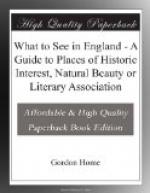A fine stone bridge of three arches connects the two portions of the town. It spans the river Arun, which is navigable up to Arundel for vessels of 150 tons burden.
[Illustration: Photochrom Co., Ltd.
ARUNDEL CASTLE.
Built soon after the Conquest by Roger de Montgomery. It was much damaged during the Parliamentary War, but was repaired by a former Duke of Norfolk early in the 19th century.]
OLNEY, BUCKS
THE HOME OF COWPER
=How to get there.=—Train from St. Pancras.
Change trains at Bedford.
Midland Railway.
=Nearest Station.=—Olney. =Distance from
London.=—60-1/2 miles. =Average Time.=—1-1/2
hours.
1st
2nd 3rd
=Fares.=—Single 8s. 1d. ... 4s. 9-1/2d.
Return
16s. 2d. ... 9s. 7d.
=Accommodation Obtainable.=—“Bull Hotel,” etc.
Olney was for a period the home of the delicate and sensitive poet William Cowper, who was born at the parsonage of Great Berkhampstead. His father was chaplain to George II. Cowper lost his mother at a very early age, and the sad event made a deep impression on his mind. In after years he wrote a poem addressed to his mother’s portrait which it is said has drawn more tears than any other poem in the English language. Cowper was sent to school at six years of age, but was very unhappy there, and it laid the foundation of that settled gloom which oppressed him all through life. When Cowper had finished his studies at the Westminster School he commenced the study of law, and was afterwards called to the bar; but he never practised, for he hated law. Cowper was offered several appointments, but failed in examinations for them from extreme nervousness. By the kindness of friends an income was secured for him and he went to reside at Huntingdon. Here he formed an acquaintance with Mrs. Unwin, the “Mary” of his poems, which ripened into deepest friendship. He enjoyed much tranquil happiness during the time of his residence with the Unwin family.




